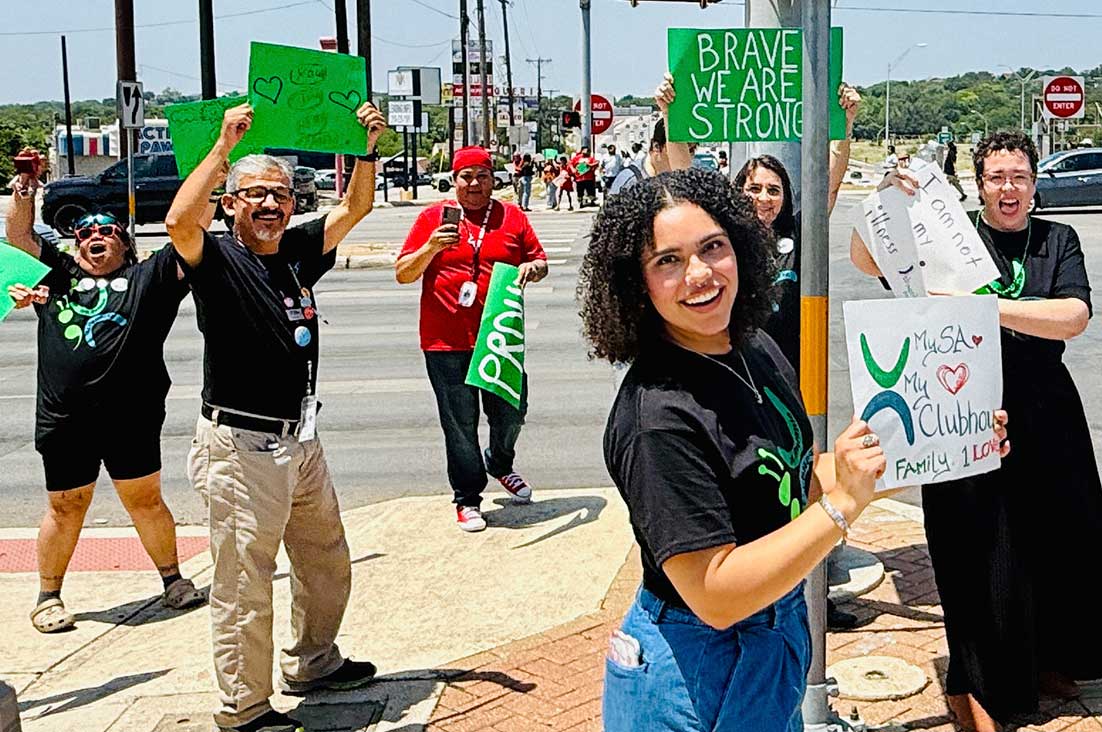We believe people can do more than manage symptoms—they build careers, strengthen relationships, and transform communities.
Most of our staff and leadership have personal recovery experience. This lived expertise informs every program, training, and service we deliver.
Based in San Antonio with in-person services across multiple Texas cities, and virtual services throughout Texas and beyond.
Click on the issues below to learn about our work
In the basement of Travis Park United Methodist Church, the very first clubhouse in San Antonio was started way back in 2003. Our early years forged a path for social justice on behalf of people who had been left behind by society and a deep belief in the power of community in the healing process.
Today, the San Antonio Clubhouse is the flagship program within form communities, a nonprofit that provides a myriad of solutions to communities near and far.

At Form Communities, we are dedicated to making a significant impact on mental health across the diverse communities of Texas. We understand that mental health is a complex and multifaceted issue, with each community having its unique set of challenges and needs. By acknowledging and addressing these differences, we work to fit the puzzle pieces together and create a comprehensive mental health support system for everyone.
Our initiatives are focused on providing targeted resources, outreach programs, and support services to various communities throughout the state. From urban areas to rural towns, we collaborate with local organizations, healthcare providers, and individuals to identify and address the specific mental health concerns affecting each community.
Whether you’re ready to make a difference with a donation or want to connect with our team about programs, partnerships, or anything else, let’s connect.

Your donation helps us increase access to peer-led mental health support, expand inclusive programs, and build healthier communities. Every dollar makes a difference.

Have a question, idea, or want to work together? Reach out to our team—we’d love to hear from you. Whether you’re an individual, organization, or just curious, we’re here.

Be the first to hear about new programs, resources, and uplifting updates.
Much of our staff, and most of the leadership team, including our Board of Directors, are in recovery from Substance Use Disorder (SUD) or Opiate Use Disorder (OUD).
providing direct Peer Support to individuals looking for recovery support in the greater San Antonio region
providing direct Peer Support to individuals looking for recovery support in the Rio Grande Valley
providing direct Peer Support to individuals looking for recovery support in Grayson County
helping people in recovery from SUD/OUD become certified as Peers, helping Texas organizations recruit and hire individuals with SUD/OUD to work as Peers, and providing funding to individuals in recovery so they can get certified as Peer Specialists
Directly training individuals in recovery from OUD/SUD to become certified as Peer Specialists to help others with their recovery.
Providing a supportive community where women, many of whom are in early recovery from SUD/OUD, can build relationships, confidence, and recovery skills.
Bringing together agencies that provide Peer Support to individuals working on substance-use recovery in the greater Houston area
Helping individuals in recovery from SUD/OUD find recovery housing options in the greater San Antonio region
Unhoused individuals experience mental illness at significantly higher rates than the general population.
Providing Peer Support at partner agencies that serve unhoused individuals
Providing a custom 2-day trauma-informed training to Peer Specialists so they’re better prepared to help individuals transition from being unhoused
Providing Peer Support to women that are actively unhoused
Helping individuals in early recovery find recovery housing options in the greater San Antonio region
Mental illness often fractures relationships and leads to isolation. Once someone is isolated, they’re also less likely to get better.
Providing a supportive community for adults with a history of mental illness
Providing peer services to individuals who may struggle to create connections in the community
Providing peer services to individuals who may struggle to create connections in the community
Providing peer services to individuals who may struggle to create connections in the community
providing a supportive community run by women in recovery, for women working on their recovery
Helping to create more Clubhouse recovery programs in Texas, or working to strengthen the existing ones
Individuals dealing with mental illness often face barriers to securing and maintaining competitive employment.
Developing job skills as they volunteer in the Clubhouse, and transfering those skills into paid employment opportunities in the community, and helping members obtain competitive and paid employment
Providing internship opportunities for indivdiuals looking to become certified as Peer Specialists, and providing Peer Support to individuals served by the Texas Workforce Commission
Providing internship opportunities for indivdiuals looking to become certified as Peer Specialists
Creating opportunities for Clubhouse members to learn computer skills within the Clubhouse
Helping indivdiuals connect to training, scholarships, internships, and employment opportunities in the Peer Support career field
Providing both state-required training programs for indivdiuals that want to become Peer Specialists, and continuing education and mentorship to help them thrive
Housing is unaffordable and inaccessible to many people. This is a key driver for many individuals feeling mentally unwell.
Helping members apply for housing benefits and identify housing resources in the community
Providing peer services to individuals dealing with housing insecurity, or connecting them to legal resources in the community
Providing peer services to individuals dealing with housing insecurity
Providing peer services to individuals dealing with housing insecurity
Providing peer services to women dealing with housing insecurity, or connecting them to resources in the community
Providing low-cost shared living spaces in residential houses to members of form communities programs
Providing 12-months of Peer-supported housing for individuals leaving the State Hospital without other housing options
Our local support systems may be well-intentioned, but can still be difficult to navigate.
Providing access to supports and resources to navigate systems, including limited amounts of accompaniment
Supporting individuals looking for ID recovery, resource connections, or resource identification support.
Supporting individuals looking for resource connections or resource identification support.
Supporting individuals looking for resource connections or resource identification support.
Providing guidance and support as individuals seek to become certified, including understanding how to get the necessary documentation for their applications
Connecting women to trusted community partners that can directly provide the resources needed by our program participants.
Listing vetted community resources directly on our website, and connecting our partners’ clients to resources

Be the first to hear about new programs, resources, and uplifting updates.